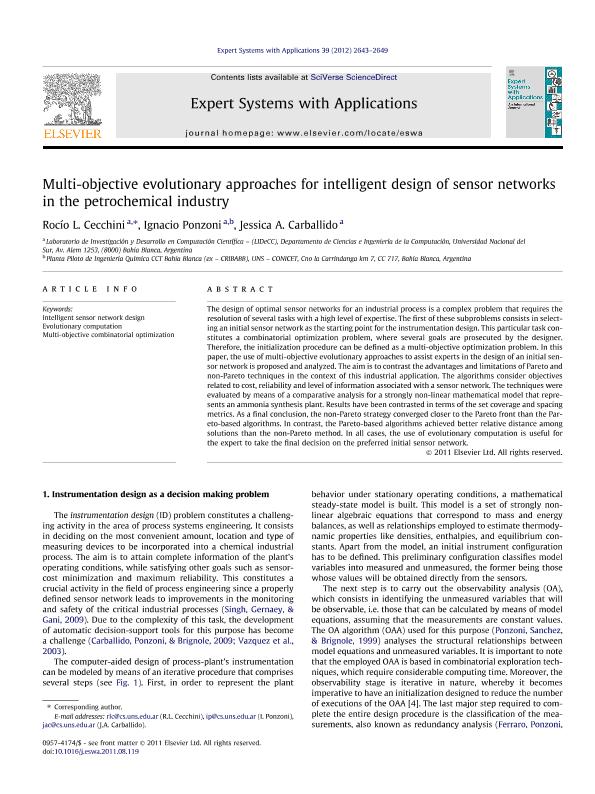Artículo
Multi-objective evolutionary approaches for intelligent design of sensor networks in the petrochemical industry
Fecha de publicación:
02/2012
Editorial:
Pergamon-Elsevier Science Ltd
Revista:
Expert Systems with Applications
ISSN:
0957-4174
Idioma:
Inglés
Tipo de recurso:
Artículo publicado
Clasificación temática:
Resumen
The design of optimal sensor networks for an industrial process is a complex problem that requires the resolution of several tasks with a high level of expertise. The first of these subproblems consists in selecting an initial sensor network as the starting point for the instrumentation design. This particular task constitutes a combinatorial optimization problem, where several goals are prosecuted by the designer. Therefore, the initialization procedure can be defined as a multi-objective optimization problem. In this paper, the use of multi-objective evolutionary approaches to assist experts in the design of an initial sensor network is proposed and analyzed. The aim is to contrast the advantages and limitations of Pareto and non-Pareto techniques in the context of this industrial application. The algorithms consider objectives related to cost, reliability and level of information associated with a sensor network. The techniques were evaluated by means of a comparative analysis for a strongly non-linear mathematical model that represents an ammonia synthesis plant. Results have been contrasted in terms of the set coverage and spacing metrics. As a final conclusion, the non-Pareto strategy converged closer to the Pareto front than the Pareto-based algorithms. In contrast, the Pareto-based algorithms achieved better relative distance among solutions than the non-Pareto method. In all cases, the use of evolutionary computation is useful for the expert to take the final decision on the preferred initial sensor network.
Archivos asociados
Licencia
Identificadores
Colecciones
Articulos(CCT - BAHIA BLANCA)
Articulos de CTRO.CIENTIFICO TECNOL.CONICET - BAHIA BLANCA
Articulos de CTRO.CIENTIFICO TECNOL.CONICET - BAHIA BLANCA
Articulos(PLAPIQUI)
Articulos de PLANTA PILOTO DE INGENIERIA QUIMICA (I)
Articulos de PLANTA PILOTO DE INGENIERIA QUIMICA (I)
Citación
Cecchini, Rocío Luján; Ponzoni, Ignacio; Carballido, Jessica Andrea; Multi-objective evolutionary approaches for intelligent design of sensor networks in the petrochemical industry; Pergamon-Elsevier Science Ltd; Expert Systems with Applications; 39; 3; 2-2012; 2643-2649
Compartir
Altmétricas




